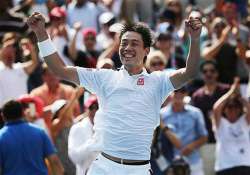US Open: '89 French champ Chang helps Nishikori to reach final
NEW YORK: Michael Chang knows what it takes to win a Grand Slam title as a player. Lately, as a coach, he's been trying to transmit some of that knowledge to Kei Nishikori while helping

NEW YORK: Michael Chang knows what it takes to win a Grand Slam title as a player. Lately, as a coach, he's been trying to transmit some of that knowledge to Kei Nishikori while helping guide him to the U.S. Open final.
Chang has been an animated presence in the courtside guest box the past two weeks, including Saturday, when Nishikori beat top-seeded Novak Djokovic 6-4, 1-6, 7-6 (4), 6-3 to become the first Japanese man to reach a Grand Slam title match.
He leans on the railing at key moments. He jumps to his feet and vigorously pumps his fists after some points. He yells encouragement after others. "It's been really helpful when I (am) getting, I don't know, tired or frustrated," Nishikori said. "You know, he can help me from the box, too."
Stefan Edberg -- a contemporary of Chang's on tour in the 1980s and 1990s, and now coaching Roger Federer -- noticed the enthusiasm with which Chang hangs on every point while Nishikori competes.
"Stefan made a comment to me yesterday. He goes: `Well, you're watching on the sidelines, but it kind of looks like you're playing.' Because the intensity and stuff is there," said Chang, who was 17 when he won the 1989 French Open, still the record for youngest male champion at a major.
"But it's hard not to be excited. It's hard not to be passionate about seeing Kei do well," Chang continued, wearing a black baseball cap advertising a pizza company. "He's a great individual. He works extremely hard and he's very focused on his tennis. It's nice to be able to see good results come from that."
Nishikori's agent, Olivier Van Lindonk, first spoke to Chang about the idea of pairing up with the player during last year's U.S. Open. A couple of months later, Nishikori met Chang for the first time, during a fundraising exhibition match in Japan.
In December, they began working together. When Chang came aboard on a part-time basis, Nishikori kept the full-time coach he's had for about four years, Dante Bottini. The three-man partnership has worked wonders, with Nishikori becoming Japan's first member of the top 10 in the ATP rankings by getting to No. 9 in May.
Bottini said Chang "brings all the experience that he had as a player. We've been working really well together. ... We complement (each other) really well." Nishikori calls Chang a "tough" coach, but also said he's played an important role on the mental side of the game.
Chang says they've connected on several levels, including how to deal with opponents who have size advantages. Chang is 5-foot-9 (1.75 meters); Nishikori is only an inch (3 centimeters) taller.
"The thing that Kei and I have in common is we do play a little bit of a similar style," Chang said, "so it's a little bit easier to instruct him and give him advice on certain things like how to handle the big guys and big serves and everything like that."
Away from the court, they found common ground, too, according to Chang, the New Jersey-born son of Taiwanese immigrants. "There's cultural differences, but there are cultural similarities as well, being that were both Asian," Chang said, adding, "Those similarities make it easier to be able to communicate well."
A victory over 14th-seeded Marcin Cilic of Croatia on Monday at the U.S. Open would allow Nishikori to become the first man from Asia to win a Grand Slam singles trophy.
So in the aftermath of the victory over Djokovic, what advice did Chang offer the 24-year-old Nishikori about playing in a major final?
"I haven't told him anything yet," Chang said. "After each match that he wins, I just keep telling him: `We're not done yet."'